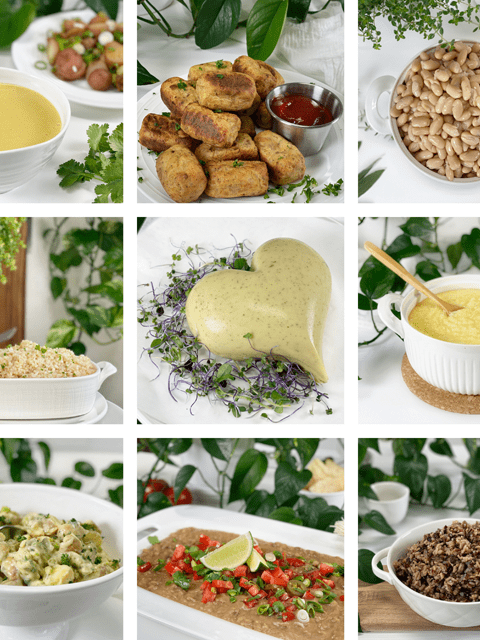


 Add to favorites
Add to favorites
Although this may be the first you’ve heard of resistant starch, it’s likely been a part of your diet most of your life. Resistant starch is a carbohydrate that resists digestion in the small intestine and ferments in the large intestine. As the fibers ferment, they act as a prebiotic and feed good bacteria in the gut. It is a type of dietary fiber found in many carbohydrate-rich foods such as potatoes, grains, and beans, particularly when these foods are cooked and cooled.
I would like to share my own personal experience with resistant starches since bringing them into my diet on a larger, conscious scale. I am continually tweaking my diet, finding foods that bring me the most comfort, physically and mentally. Over the years, I became fearful of high-carb foods, much like the fear of fats that I latched onto in the ’80s. I have spent a good portion of my life adjusting my diet to the latest trends, but thankfully through ALL those experiences, I have learned a lot of good habits (and some bad ones!).
It sounds strange to be thankful for the bad habits, but I always seek the silver lining in all that I experience. Anyway…since I have introduced higher-starch foods (whole food forms), I have noticed a huge increase in my physical energy and the fog in my brain has lifted, increasing my mental energy, which leads to a higher form of quality productivity and motivation.
My stomach issues continue to improve–I am much less bloated and have less stomach pain, my bathroom trips are full of joy (says the girl who spent her whole life constipated…TMI?) and my overall continence is just better. Even Bob has witnessed the changes without me even talking about it. “CAN I GET A WITNESS??” (This is where Bob would chime in if he knew I was writing this.)
Anyway, it’s been a blessing and has greatly shifted things for me. I am not here to convince others to follow my path. I feel it’s so important for each of us to find what works for our bodies…thus nudging us in the right direction of optimal health. So that’s my story and I am sticking to it.
John Hopkins Medicine states, “When starches are digested they typically break down into glucose. Because resistant starch is not digested in the small intestine, it doesn’t raise glucose. Gut health is improved as fermentation in the large intestine makes more good bacteria and less bad bacteria in the gut. Healthy gut bacteria can improve glycemic control. Other benefits of resistant starch include increased feeling of fullness, treatment and prevention of constipation, decrease in cholesterol, and lower risk of colon cancer. Resistant starch is fermented slowly so it causes less gas than other fibers.” (1)
It’s as simple as eating starchy carbs that have been cooked, cooled, and then reheated (in that order). If you want a more scientific answer, Google is your never-ending encyclopedia. But here it is dumbed down.
What happens here is that by cooling these starches you’re converting the carbohydrate (made mostly of digestible starch) into one that is indigestible, or “resistant.” It’s called resistant starch because it becomes resistant to the normal enzymes in your gut that break carbs down and release glucose that then causes blood sugar surges.
Here are just a few recipes I have created that contain resistant-starch foods. Even if this subject matter doesn’t raise your eyebrows, the taste of these recipes will.
Resistant starch occurs in a number of natural foods. This includes a lot of grains, a lot of legumes, many tubers such as potatoes, and many fruits, especially unripe bananas and plantains. Here is a list of common everyday whole foods that we often enjoy. There are more out there, but this is a good start.
Below I am sharing some of the common foods that are considered a resistant starch.
Legumes
Fruit
Grains
Vegetables
Flours
I wrote this post to shed some light on the science behind some of the foods we eat. Books have been written on this topic, so please dig deeper if you found this interesting. I sure did! I am not a medical professional. Please do not take anything I say here as medical advice. You should always consult with your doctor before changing or starting any new diet program, especially if you have health conditions.